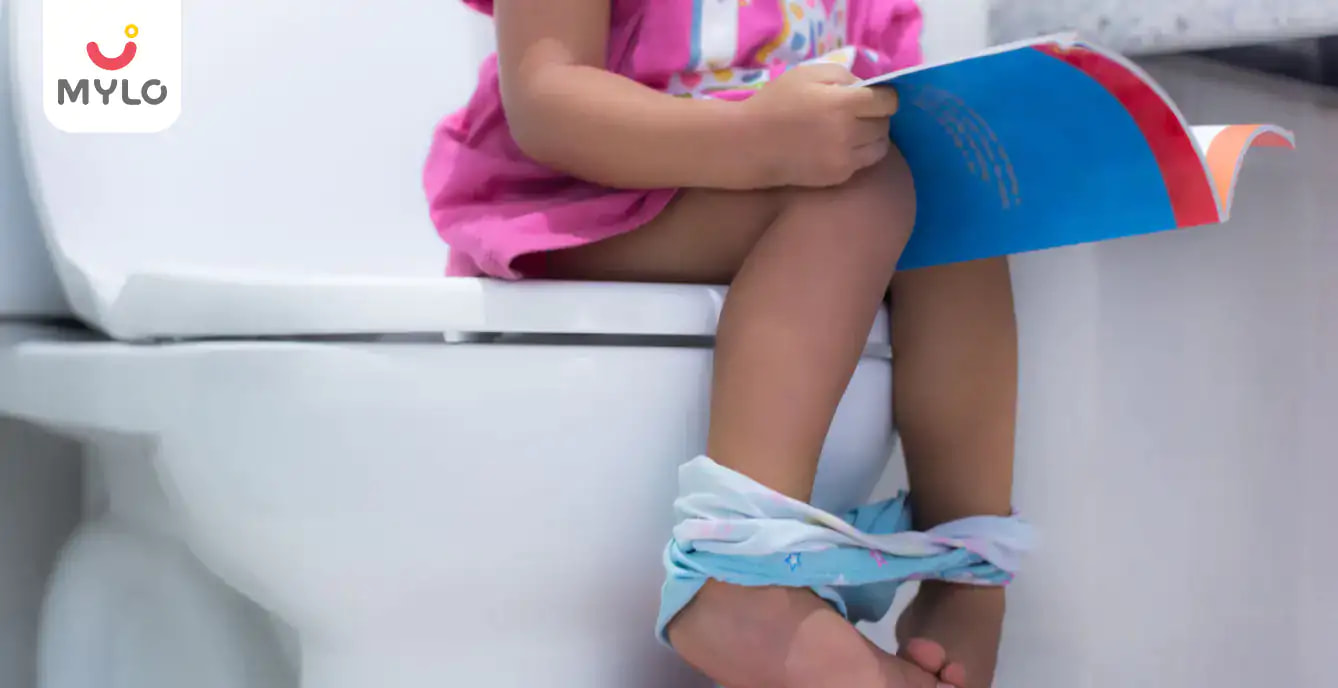Home

Potty Training

Tips on Starting Potty Training for Kids
In this Article

Potty Training
Tips on Starting Potty Training for Kids
Updated on 3 November 2023
Parents are often knee-deep in diapers after having a baby. They are tucked in the bag, stacked along the crib, and stored in every nook and corner of the house. Diapers have become a part of life. It almost feels like the day the child walks into the toilet, poops, and cleans himself is a long way off.
It is a new milestone for the child. As a parent, it is essential to let the babies take their time to master the skill. It is important to start potty training for babies by the age of 2years. Every child differs, and it is best not to compare their progress.
How Do Parents Know If The Kid Is Ready?
Children can gain control over their bladder and bowel when they are physically ready and want to feel dry and clean. It should be kept in mind that most kids develop control over bowel movements first.
- By 1yr, most babies stop pooing at night.
- By 2yrs- Some kids can stay dry during the day.
- By 3yrs – Most kids stay dry during the day. Accidental elimination could be expected when they are excited or asleep.
- By 4yrs- Most kids are dry throughout the day.
Most kids take longer to stay dry throughout the night. Most children can gain control over bedwetting by 3-5yrs. However, some may continue it for longer. If the bedwetting continues beyond 6, it is better to meet the doctor.
You may like: What Does Your Baby's Poop Or Stool Color Say About Their Health
Signs of Potty Training Readiness
If the child shows these signs, infant potty training can be started.
- Pulling down the wet diaper
- Hide pee or poop
- Showing interest in how adults act.
- Diaper staying dryer than usual time. Show they have gained control.
- Waking up due to a wet diaper
- She is telling the parent before or immediately after passing poo or pee.
When To Start Potty Training
There is no hard and fast rule to start. Kids take their time to learn to talk and walk; they take their time to wean from diapers. How will a parent know when to start potty training for babies?
- Kids usually begin to show signs of dislike towards diapers.
- Most kids show interest in potty training by 2-2.5.
- Summers are better times to begin in cold countries. The clothes can be taken off and dried off more easily.
- Begin and stay consistent
- Best to wait till the kid says before peeing. This is the best period to start.
- They should be able to sit on the potty in their comfort.
Ways To Prepare A Child For Potty Training
How to potty train a baby? Most parents often wonder how to begin this process.
Here are some tips that put the child at ease and give them space to get comfortable with the process:
- Parents should have a positive attitude and not be forceful.
- Talking to the child and explain about it. Understand their willingness and fears.
- It is placing the potty in a place that is accessible to them.
- If an older kid is in the house, show them while the kid uses it.
- Using their toys as models. Making it into a fun activity.
- They are allowing the child to sit on it and feel comfortable.
- Allowing them to sit on it between nappy changes. Seeing if it makes them happy.
Potty Training Tips for Kids
Keep Potty in the Bathroom
- If the house has two storeys, keep it in both bathrooms. Here the aim is to get the child comfortable sitting on the potty.
- Suppose the child poos consistently at the same time every day. Remove the diaper to indicate that they have to poo in the toilet.
- Parents should not make a fuss when a child is unsuccessful.
- Praising is the best form of encouragement.
Potty Training Pants
- Disposable washable pants
- Encourage kids to keep training pants dry.
- Suppose the child does not wean from the nappy; place toilet paper in the nappy. This causes the nappy to be wet for a long time, making the child feel wet.
Nighttime Potty Training
- When the child wakes up with a dry nappy for a few mornings in a row. It is an indication that they are weaning,
- Encourage the child to use the bathroom just before going to bed. The use of non-absorbant sheets is helpful.
Conclusion
Potty training can be a challenge for most parents. Most parents prefer to wait till their child is at least 18 months, as the little ones acquire control of their muscles by then. We hope the tips shared in the article help you succeed in your endeavour.
Trending Articles
Baby Acne | Baby Crying | How to Hold Newborn Baby | Baby Gas
Popular Articles
Baby Poop color | Swaddling | Babywearing | How to Use Cloth Diapers

Mylo Baby Diaper Pants (S) Size – 12-Hour Leak-Proof Protection for Happy Babies
Lightweight | Rash Free | 12 Hours Protection | ADL Technology
₹ 423

4.4
(91982)


155539 Users bought



Written by
Shweta Puneyani
To be mom...soon
Read MoreGet baby's diet chart, and growth tips

Related Articles
Related Topics
RECENTLY PUBLISHED ARTICLES
our most recent articles

Diet & Nutrition
গর্ভাবস্থায় আলুবোখরা: উপকারিতা ও ঝুঁকি | Prunes During Pregnancy: Benefits & Risks in Bengali

Diet & Nutrition
গর্ভাবস্থায় হিং | ঝুঁকি, সুবিধা এবং অন্যান্য চিকিৎসা | Hing During Pregnancy | Risks, Benefits & Other Treatments in Bengali

Women Specific Issues
স্তনের উপর সাদা দাগ: লক্ষণ, কারণ এবং চিকিৎসা | White Spots on Nipple: Causes, Symptoms, and Treatments in Bengali

Diet & Nutrition
গর্ভাবস্থায় পোহা: উপকারিতা, ধরণ এবং রেসিপি | Poha During Pregnancy: Benefits, Types & Recipes in Bengali

Diet & Nutrition
গর্ভাবস্থায় মাছ: উপকারিতা এবং ঝুঁকি | Fish In Pregnancy: Benefits and Risks in Bengali

Diet & Nutrition
গর্ভাবস্থায় রেড ওয়াইন: পার্শ্ব প্রতিক্রিয়া এবং নির্দেশিকা | Red Wine During Pregnancy: Side Effects & Guidelines in Bengali
- ইনার থাই চ্যাফিং: কারণ, উপসর্গ এবং চিকিৎসা | Inner Thigh Chafing: Causes, Symptoms & Treatment in Bengali
- গর্ভাবস্থায় ব্রাউন রাইস: উপকারিতা ও সতর্কতা | Brown Rice During Pregnancy: Benefits & Precautions in Bengali
- Velamentous Cord Insertion - Precautions, Results & Safety
- Unlock the Secret to Flawless Skin: 7 Must-Have Qualities in a Face Serum
- Unlock the Secret to Radiant Skin: How Vitamin C Serum Can Transform Your Complexion
- Gender No Bar: 10 Reasons Why Everyone Needs a Body Lotion
- Unlock the Secret to Radiant Skin How to Choose the Perfect Body Lotion for Your Skin Type
- Top 10 Reasons to Apply a Body Lotion After Every Bath
- Communication in Toddlers: Milestones & Activities
- How to Improve Vocabulary for Toddlers?
- A Comprehensive Guide to Understanding Placenta Accreta
- Vulvovaginitis in Toddlers Causes, Symptoms and Treatment
- A Comprehensive Guide to Understanding Cerebral Palsy in Children
- Bitter Taste in Mouth During Pregnancy: Understanding the Causes and Remedies


AWARDS AND RECOGNITION

Mylo wins Forbes D2C Disruptor award

Mylo wins The Economic Times Promising Brands 2022
AS SEEN IN
















- Mylo Care: Effective and science-backed personal care and wellness solutions for a joyful you.
- Mylo Baby: Science-backed, gentle and effective personal care & hygiene range for your little one.
- Mylo Community: Trusted and empathetic community of 10mn+ parents and experts.
Product Categories
baby carrier | baby soap | baby wipes | stretch marks cream | baby cream | baby shampoo | baby massage oil | baby hair oil | stretch marks oil | baby body wash | baby powder | baby lotion | diaper rash cream | newborn diapers | teether | baby kajal | baby diapers | cloth diapers |




